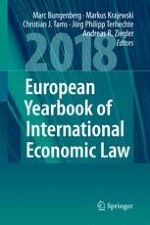Volume 9 of the EYIEL focusses on natural resources law understood as a special area of international economic law. In light of increasing conflicts over access to and the use of natural resources and of their impact on political, social and environmental aspects, the contributions of this volume analyse to which extent international economic law can contribute to the sustainable exploitation, management and distribution of natural resources. The volume collects contributions on general principles of natural resources law, the importance of natural resources for trade, investment and European economic law as well as analyses of particular sectors and areas including fracking, timber, space and deep seabed mining and natural resources in the arctic region.
In its section on regional developments, EYIEL 9 addresses two regional integration systems which are usually not at the centre of public interest, but which deserve all the more attention due to their special relations with Europe: The Eurasian Economic Union and the Caribbean Community (CARICOM). Further EYIEL sections address recent WTO and investment case law as well as developments at the IMF. The volume also contains review essays of important recent books in international economic law and other aspects of international law which are connected to international economic relations.
The chapter "Sovereignty, Ownership and Consent in Natural Resource Contracts: From Concepts to Practice" by Lorenzo Cotula is open access under a CC BY 4.0 license via link.springer.com.
